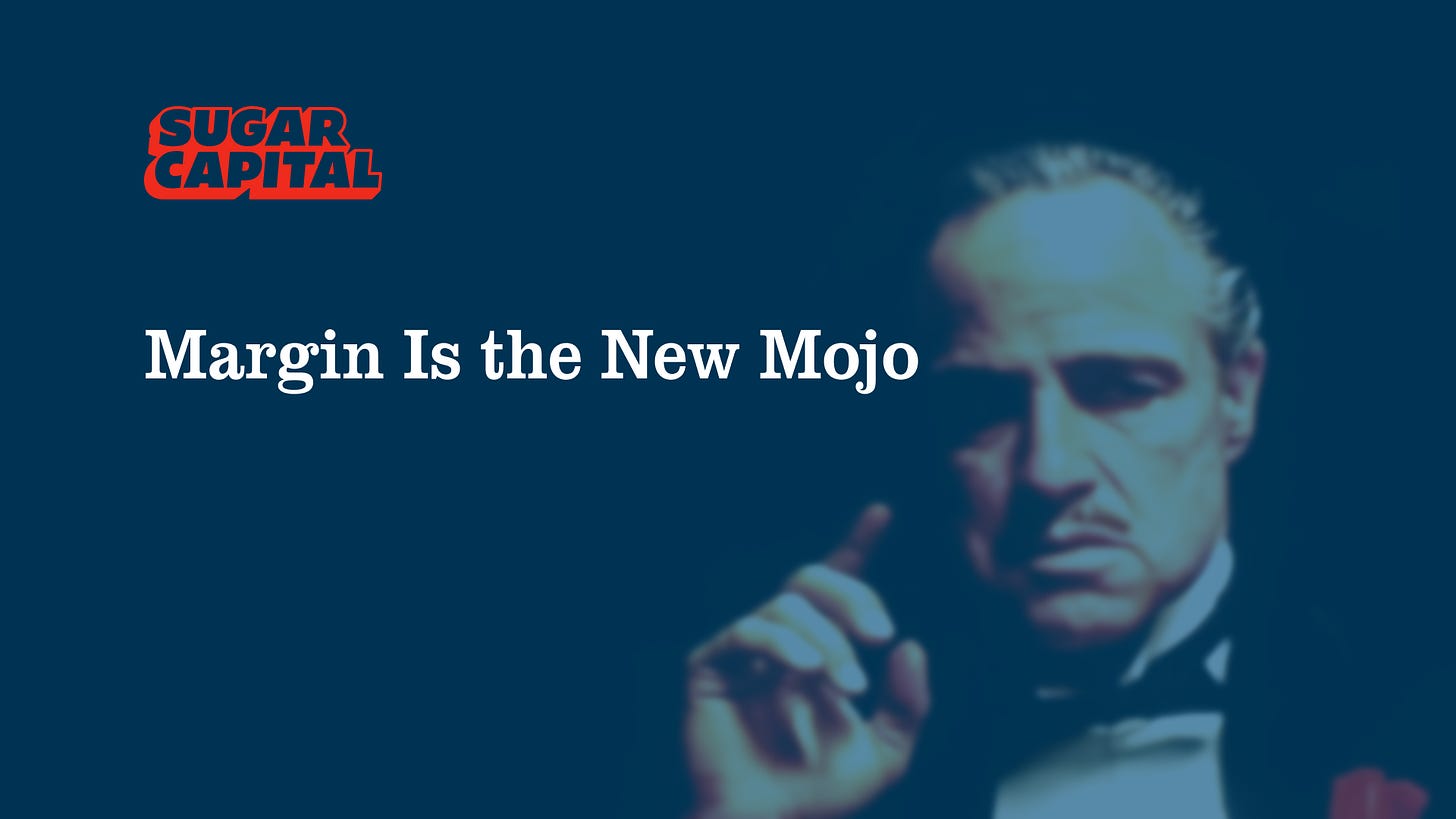Margin Is the New Mojo
Why Today’s Best Founders Engineer Margins Before Headlines
“Great men are not born great, they grow great.” - Don Corleone, The Godfather (1972)
The consumer landscape is a graveyard of beautiful failures. Beverages, snacks, supplements, skincare, even tech-enabled home goods. Brands that captured attention but lost the plot. Stunning packaging, clever campaigns, influencer endorsements, followed inevitably by bankruptcy filings. For every brand that endures, dozens vanish because they succumbed to the industry’s most seductive lie: that margin is something you figure out later.
I’ve watched this cycle play out across three decades and countless consumer categories. And the winners, the true revolutionaries, aren’t the loudest voices or the fastest growers. They’re the visionaries who understood something counterintuitive: financial discipline doesn’t constrain ambition, it unleashes it.
The Fantasy of “Growth Now, Margins Later”
The most dangerous delusion in consumer isn’t believing you might fail. It’s believing you can outgrow your way to profitability.
Founders parade TAM slides, tout explosive velocity, chase virality, while hemorrhaging cash. The promised land of sustainability almost never arrives.
Nowhere is this pattern more common than in fast-moving consumer categories like beverage, beauty, wellness, and food. These products tempt with simplicity, then punish with operational complexity. A brand can raise a war chest, secure national distribution, and still evaporate because they ignored the one true line between ephemeral and enduring: gross margin.
Grow now, fix later isn’t strategy, it’s malpractice in a hoodie.
Day-One Margins: The Ultimate Competitive Weapon
The revolutionary founder understands this: embedding gross margin into your DNA isn’t cautious, it’s radical.
50%+ gross margin in year one? That’s not safe. That’s a declaration of war.
It means you’ve designed your business to fund its boldest moves. Every component—formulation, packaging, supply chain, pricing—has been architected with strategic freedom in mind.
Anyone can say, “We’ll improve margin at scale.” What they really mean is, “We’re building the house on a cracked foundation.”
Discipline doesn’t slow you down. It lets you take the swing that changes the game.
The founders who hit unprecedented margins early aren’t lucky, they’re obsessed. They view financial architecture as part of product development. And they understand that the right to be bold must be purchased with discipline.
Performance Marketing: The Addiction That Kills Brands
Nothing has created more temporary billionaires, or more permanent failures, than the myth of performance marketing.
It flatters your CAC. It masks fragility. But it builds rental agreements, not relationships.
The moment someone else shows up with slightly better creative or a marginally stronger offer, your growth engine collapses. You didn’t build a brand. You gamed an algorithm.
“When the rules changed, you had nothing left.”
Behind so many rapid implosions lies the same mistake: arbitrage disguised as strategy, brand-building delayed in favor of short-term efficiency.
Brand Isn’t a Line Item, It’s the Whole Equation
The most valuable work in consumer doesn’t show up in spreadsheets.
It’s the founder telling a story so powerful retail buyers start calling you. It’s the CMO building cultural gravity that reshapes behavior.
“You can’t model cultural gravity. But when you build it, the market tilts toward you.”
These brands don’t just sell products. They own mindshare. They charge premiums because they’ve earned trust. They become impossible to imitate, because they built something that can’t be copied: emotional territory.
The False Binary: Why Discipline Fuels Vision
Average founders think it’s either creativity or control. Exceptional founders know better.
They’ve mastered timing. When to burn. When to bank. When to look irrational to gain permanent advantage.
“Discipline isn’t the opposite of boldness. It’s what makes boldness possible.”
Launching in a heavier format—glass, liquid, full-size kits—to build trust, then expanding into lighter SKUs or DTC-native formats to improve economics? That’s not a pivot. That’s chess.
Beyond Management: Founders as Category Architects
Operators follow playbooks. Founders write new ones.
They don’t compete in crowded categories, they redefine what the category means.
Where others see saturation, they see white space. Where others fight for shelf space, they reshape how customers think about the shelf.
“They aren’t playing the game. They’re changing the rules.”
But you can’t change the rules if you’re drowning in poor unit economics.
The Ultimate Investor Filter
Not every investor deserves a seat on a cap table like this.
Many prefer clean models, familiar growth patterns, and tidy risk. That’s fine—for average companies.
But generational founders need generational capital. Investors who understand:
that spreadsheets don’t create magic, conviction does
that margin isn’t a nice-to-have, it’s a permission slip to be audacious
that culture beats metrics when building lasting companies
“If you want to build something iconic, make sure your backers actually believe in iconography.”
The New Rules of Engagement
The future belongs to the disciplined maverick.
Vision without economics is a hallucination. Economics without vision is a commodity.
The next great consumer brands will:
Start with real margins
Spend with surgical intent
Build emotional moats
Scale culture, not just logistics
“We’re done pretending scale equals greatness.”
These companies won’t follow the old trajectory of boom and fade. They’ll endure because they were engineered for permanence from day one.
In the end, anyone can copy your packaging or mimic your voice. But no one can replicate conviction baked into your margin or vision disguised as rigor.
That’s not a product. That’s a founder.


